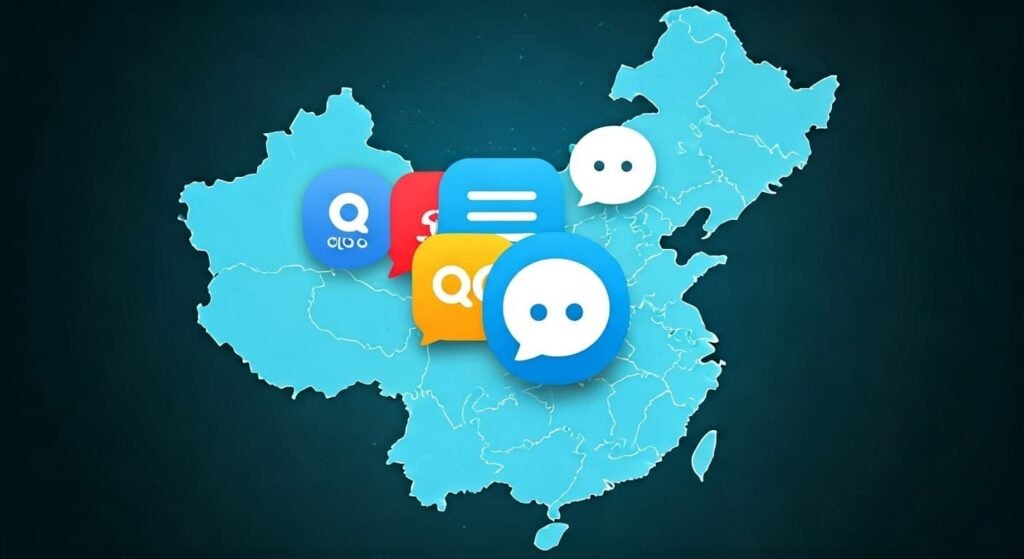Top Messaging Apps That Actually Work in China
Discover what messaging apps work in China to stay connected in a digital world. Explore the top messaging apps in our blog!

Key Highlights
- Discover the best messaging apps that work well in mainland China, getting around the Great Firewall.
- Learn about popular apps like WeChat and QQ. These are preferred by Chinese users because of their unique features.
- Understand why VPNs are key for accessing western social media platforms like WhatsApp and Facebook Messenger in China.
- Find out which communication tools are preferred by businesses in China for smooth communication.
- Get ideas on why specific apps are blocked and learn simple tips for staying connected while in China.
China’s internet is heavily regulated by the “Great Firewall,” which blocks many Western messaging and social media apps. Major platforms like Facebook (and its Messenger) and Google services are banned in mainland China. WhatsApp and similar encrypted apps have also been censored (WhatsApp was blocked around 2017). In practice, foreigners in China rely on Chinese chat apps or VPNs. In fact, any list of “top 10 China chatting app” always puts WeChat at #1, followed by a few homegrown services.
For example, WeChat alone has over 1.2 billion active users, making it by far China’s most popular and best app for chatting. QQ and DingTalk are also widely used. Below we cover the main China-based messaging apps and explain which Western apps work (or don’t) in China.
Popular Messaging Apps Effective in China

For anyone who wants simple communication in China, it’s best to use apps created there. These apps are popular with Chinese users. They work well without needing a VPN.
Here are three popular messaging apps in China. They offer more than just simple messaging. Many users really enjoy using them:
1. WeChat (微信): More Than Just Messaging
Tencent’s all-in-one “super app” dominates China’s chat market. It supports text/voice messages, group chats, video calls, payments, mini-programs (games, shopping, food delivery, taxi booking, etc.), and more. WeChat has about 1.2 billion active users, so it’s by far China’s most popular chat app. It’s generally the best app for chatting in China because nearly everyone uses it.
WeChat is the top app for social media and communication in China, leveraging AI technology to enhance user experience. Tencent made it, and it has more than a billion Chinese users every month. With WeChat, you can send text and voice messages, share photos and videos, and chat in groups easily.
WeChat is not just a messaging app. You can use it to shop online, order food, book appointments, and even get a taxi. This app is useful and fits easily into daily life. This is why many people in China find it essential.
2. QQ: Connecting Through Diverse Features
Many people use WeChat, but Tencent’s QQ still has many fans, especially young users. QQ began as a messaging app. Now, it has become a fun platform with many features.
Also by Tencent, QQ is an older instant-messaging platform still popular with young users. In 2023 QQ had roughly 597 million monthly active accounts. QQ offers text/voice chat, video calls, file sharing, online games, and virtual avatars (QQ Show). Though many QQ users now also use WeChat, QQ remains a major Chinese messaging app.
Users can make video calls and share files easily. There are also features for online gaming and choosing virtual avatars. QQ meets a lot of different interests. In addition, it has QQ Show, which allows people to share blogs, photos, and diaries. This shows how QQ keeps up with new trends in social media.
3. DingTalk (钉钉): The Business Communication Solution
DingTalk is an app made by the Alibaba Group. It has become the top platform for businesses to communicate in China. DingTalk provides a secure way for companies to connect with their employees, partners, and clients all over the country.
The app has several tools that make work simpler. It offers instant messaging, group chats, video calls, task management, and file sharing. The helpful features of DingTalk have turned it into a must-have app for businesses in China and for those working with Chinese companies.
4. Momo (陌陌)
A location-based social app (sometimes called China’s Tinder), Momo has over 100 million users and ~60 million monthly actives. It lets people send free text, voice, pictures, and locations to others nearby, join group chats, or watch live streams. While it’s primarily a social/dating platform, Momo includes rich chat features, making it one of China’s bigger messaging apps.
5. Others
There are various other China-made chat apps. ByteDance’s Feishu (Lark) is a team collaboration app growing among businesses. Alibaba also has AliWangWang (chat for e-commerce), and Tencent Meeting (VooV) for video conferencing. Local social networks like Weibo (microblog) or Douyin (short video) have messaging features, but the apps above are the main messaging-focused ones.
Which International Chat Apps Work in China?
Most international messaging apps are blocked under China’s censorship rules. For example, Facebook (and its Messenger) have been banned in China since 2009. Likewise, WhatsApp, Telegram, Signal, Line, KakaoTalk and others are inaccessible without a VPN. In short, does Messenger work in China? – No. Facebook’s platforms are off-limits to regular connections in mainland China.
- WhatsApp: You cannot use WhatsApp in China (without a VPN). It was effectively blocked around 2017 due to its strong end-to-end encryption.
- Facebook/Messenger: Both Facebook and Messenger are blocked by the Great Firewall.
- Telegram/Signal/LINE/Kakao: All major privacy-focused apps (Telegram, Signal, etc.) are also blocked.
- Skype (Teams): Microsoft’s Skype is in a gray area. It “sometimes works” but is unreliable in China. (Newer Microsoft Teams can often be used in corporate environments, but may be throttled.)
- Google Services: Google Chat, Hangouts/Meet, Gmail, etc., are all blocked (Google is generally banned).
- Apple iMessage/FaceTime: These are exceptions. Apple has negotiated to keep iMessage and FaceTime operational in China. Many expats report that iMessage still works (and can send messages or calls to other iPhones) without a VPN, because Apple uses Chinese servers. In practice, iMessage generally functions in China (with variable reliability).
In summary, which chat apps work in China?
Only the Chinese apps listed above (WeChat, QQ, DingTalk, Momo, etc.) plus a few global exceptions like iMessage. Most Western apps (WhatsApp, Facebook/Messenger, Instagram, Snapchat, etc.) will not work unless you use a VPN.
Best China App for Chatting
By far, WeChat is the best app to use for chatting in China. It’s considered the default communication platform for almost all Chinese residents. WeChat’s features, user base, and integration into daily life (from chat to payments to government services) make it essential. QQ is the second-largest Chinese chat app, and DingTalk is excellent for business/team chats. But if you ask “what’s the best chat app in China?” or “China’s most popular chat app?” – the answer is unequivocally WeChat.
Video Calling and Conferencing in China
For video calls and online meetings, Chinese apps again lead:
- WeChat/QQ Video: Both support one-on-one or group video calling. They work reliably within China’s networks.
- DingTalk: Built-in HD video conferencing for up to hundreds of participants.
- Tencent Meeting (VooV Meeting): A Zoom-like service by Tencent, with over 10 million daily users in China in early 2020 (and likely much more now). It’s widely used for business and education.
- Zoom/Google Meet: These do not work by default. Zoom is “completely inaccessible in China” without a VPN. Google Meet is blocked along with all Google services.
- Skype(Teams): Works sporadically but often unreliable.
- Apple FaceTime: Works on iPhones, as noted, similar to iMessage.
So what video call apps work in China?
Use local solutions (WeChat, QQ, DingTalk, Tencent Meeting) for best results. Most Western video apps require a VPN to function.
Conclusion
In conclusion, it’s very important to know about messaging apps in China for good communication. WeChat is a great platform that does much more than just messaging. QQ offers many features to stay connected. DingTalk is a strong choice for business conversations. Visitors might find WeChat useful, but using WhatsApp in China often needs a VPN.
Locals mostly use these apps to talk, including Telegram, and each app meets different needs. Exploring these apps can help you improve your online interactions in China. If you want smooth communication, getting used to these messaging platforms is essential.
FAQs
Can international visitors use WeChat in China?
International visitors can get WeChat from app stores like Google Play (if you are not in China) or the Apple App Store. You just need a valid phone number to register. Be sure to have a good internet connection too.
Can I use WhatsApp in China?
Unfortunately, you can’t use WhatsApp in China. This is due to strict internet control known as the Great Firewall of China. If you want to access WhatsApp, you will need a good VPN to bypass these restrictions.
How do locals in China communicate digitally with the outside world?
Many websites from the West are difficult to access in China. To solve this issue, many people use VPNs. VPNs, including various VPN websites, allow them to connect and communicate with people outside of the country. However, VPNs don’t always function properly. The Chinese government also works to control how these VPNs are used.
What makes DingTalk a preferred app for businesses in China?
DingTalk is popular with businesses in China. It makes communication easy, even with the firewall. It has many features designed for work tasks. This makes it a helpful tool.
Does WhatsApp work in China?
WhatsApp is not allowed in China due to the actions of the Chinese authorities. You can’t use the app there unless you have a VPN. The Great Firewall of China blocks it. So, you need a VPN to bypass the censorship.
Can I use iMessage (or FaceTime) in China?
In China, iMessage isn’t fully blocked, but it can have issues. Some people find it hard to send or receive messages.
Does Zoom work in China?
Using Zoom in China, especially with China Telecom, can be difficult. The international version requires a VPN to work well. A local version is available, but it has fewer features. To have complete access, businesses need to partner with local companies.
Does T-Mobile work in China?
T-Mobile users can use the internet and cell services in China by getting a SIM card. They can do this through international roaming plans. However, the charges can be very high. It is a good idea to activate a specific plan for China to save some money.
Does Gmail work in China?
Gmail is blocked in China, just like other Google services, including the Wall Street Journal. If you want to check your emails on Gmail, you will need to use a VPN. A VPN can help you bypass the Great Firewall of China.
Does Instagram work in China?
Instagram is not available in China unless you use a VPN. The Chinese government has tough rules about social media since September. They control access to platforms they do not like. Therefore, you will need a VPN to use Instagram.
Does FaceTime work in China?
FaceTime is still available in China on your iOS device. However, the call quality may vary. You might have delays or missing connections. Using a VPN could make your FaceTime calls clearer and more stable.
Does Skype work in China?
Skype is not officially banned in China. However, it might not work well due to the Great Firewall of China. To improve your experience, it is a good idea to use a VPN.
Does Outlook work in China?
Microsoft’s Outlook email service is not available in China, similar to Gmail. To access Outlook, you must use a VPN. A VPN helps you bypass the firewall and read your emails.
Does Microsoft Teams work in China?
Microsoft Teams is a popular tool for business communication in Europe. You can use it in China, but only through a special version that is operated by 21Vianet. This version follows the rules set in China.
Does LINE work in China?
LINE is a popular messaging app used in many areas of Asia. However, the Chinese government has blocked it and several other social media platforms. If you want to use LINE in China, you will need a VPN.
Which video conferencing apps can I use in China?
Use Chinese ones. WeChat, QQ, DingTalk (阿里钉钉) and Tencent Meeting (VooV) all support video calls. Global apps like Zoom, Google Meet, or even Skype do not work well without a VPN. In short, rely on the Chinese apps above for video calls and conferences.
Recent Posts
- Top Guangzhou Watch Markets to Visit in 2025: The Ultimate Insider’s Guide
- My Guide to the Best Home Appliance Markets in Guangzhou
- Guangzhou Garment Wholesale Markets: My Local Guide
- Best Hotel in Guangzhou: A Comprehensive Guide for Foreign Travelers
- Guangzhou Food Guide: Must-Try Dishes & Top Restaurants (2025 Edition)
Recent Comments
Top Guangzhou Watch Markets to Visit in 2025: The Ultimate Insider’s Guide
I visited the top watch markets in Guangzhou to show you where...
My Guide to the Best Home Appliance Markets in Guangzhou
Explore top offline home appliance markets in Guangzhou with local tips, Chinese...
Best Hotel in Guangzhou: A Comprehensive Guide for Foreign Travelers
Find the best hotels in Guangzhou—from luxury icons to local favorites. Updated...
Guangzhou Food Guide: Must-Try Dishes & Top Restaurants (2025 Edition)
I’m an expat in Guangzhou sharing the best local dishes, top restaurants...







Leave a comment